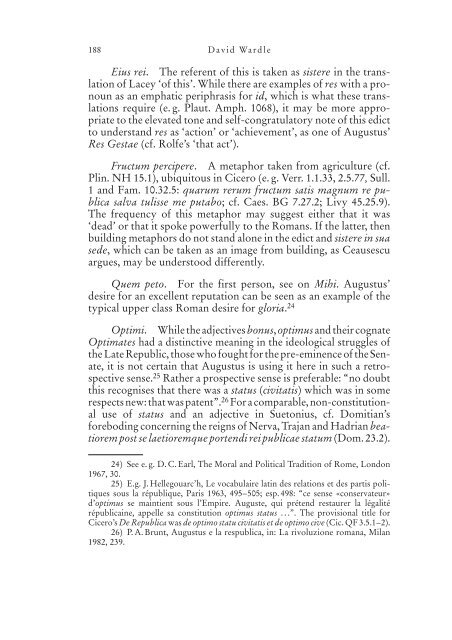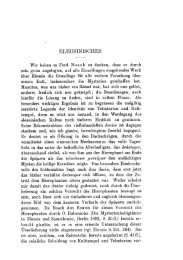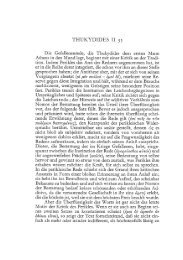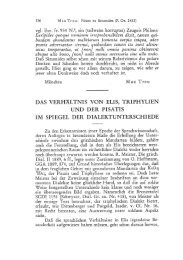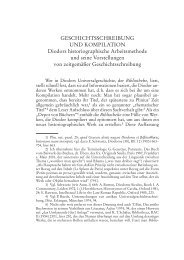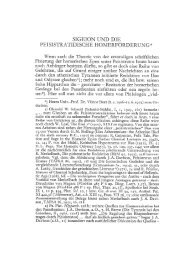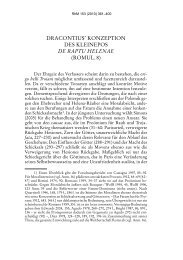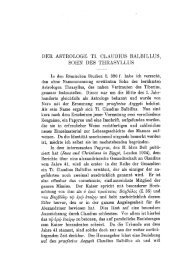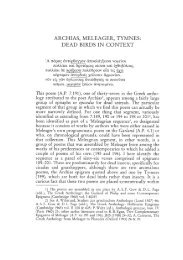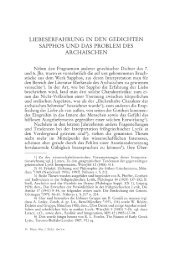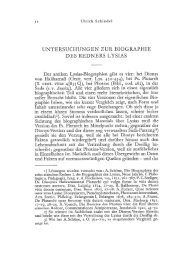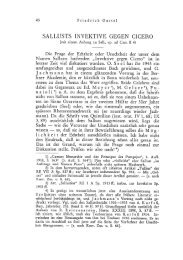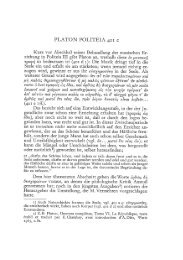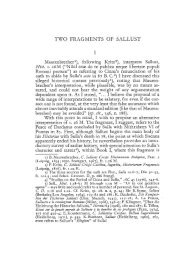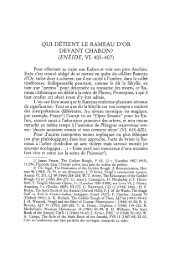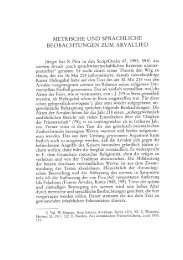VIRGILIO E STESICORO Una ricerca sulla Tabula Iliaca Capitolina *
VIRGILIO E STESICORO Una ricerca sulla Tabula Iliaca Capitolina *
VIRGILIO E STESICORO Una ricerca sulla Tabula Iliaca Capitolina *
Sie wollen auch ein ePaper? Erhöhen Sie die Reichweite Ihrer Titel.
YUMPU macht aus Druck-PDFs automatisch weboptimierte ePaper, die Google liebt.
188 David Wardle<br />
Eius rei. The referent of this is taken as sistere in the translation<br />
of Lacey ‘of this’. While there are examples of res with a pronoun<br />
as an emphatic periphrasis for id, which is what these translations<br />
require (e. g. Plaut. Amph. 1068), it may be more appropriate<br />
to the elevated tone and self-congratulatory note of this edict<br />
to understand res as ‘action’ or ‘achievement’, as one of Augustus’<br />
Res Gestae (cf. Rolfe’s ‘that act’).<br />
Fructum percipere. A metaphor taken from agriculture (cf.<br />
Plin. NH 15.1), ubiquitous in Cicero (e. g. Verr. 1.1.33, 2.5.77, Sull.<br />
1 and Fam. 10.32.5: quarum rerum fructum satis magnum re publica<br />
salva tulisse me putabo; cf. Caes. BG 7.27.2; Livy 45.25.9).<br />
The frequency of this metaphor may suggest either that it was<br />
‘dead’ or that it spoke powerfully to the Romans. If the latter, then<br />
building metaphors do not stand alone in the edict and sistere in sua<br />
sede, which can be taken as an image from building, as Ceausescu<br />
argues, may be understood differently.<br />
Quem peto. For the first person, see on Mihi. Augustus’<br />
desire for an excellent reputation can be seen as an example of the<br />
typical upper class Roman desire for gloria. 24<br />
Optimi. While the adjectives bonus, optimus and their cognate<br />
Optimates had a distinctive meaning in the ideological struggles of<br />
the Late Republic, those who fought for the pre-eminence of the Senate,<br />
it is not certain that Augustus is using it here in such a retrospective<br />
sense. 25 Rather a prospective sense is preferable: “no doubt<br />
this recognises that there was a status (civitatis) which was in some<br />
respects new: that was patent”. 26 For a comparable, non-constitutional<br />
use of status and an adjective in Suetonius, cf. Domitian’s<br />
foreboding concerning the reigns of Nerva, Trajan and Hadrian beatiorem<br />
post se laetioremque portendi rei publicae statum (Dom. 23.2).<br />
24) See e. g. D. C. Earl, The Moral and Political Tradition of Rome, London<br />
1967, 30.<br />
25) E.g. J. Hellegouarc’h, Le vocabulaire latin des relations et des partis politiques<br />
sous la république, Paris 1963, 495–505; esp. 498: “ce sense «conservateur»<br />
d’optimus se maintient sous l’Empire. Auguste, qui prétend restaurer la légalité<br />
républicaine, appelle sa constitution optimus status ...”. The provisional title for<br />
Cicero’s De Republica was de optimo statu civitatis et de optimo cive (Cic. QF 3.5.1–2).<br />
26) P. A. Brunt, Augustus e la respublica, in: La rivoluzione romana, Milan<br />
1982, 239.


